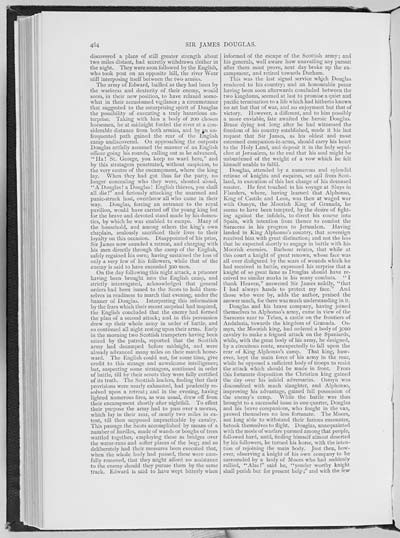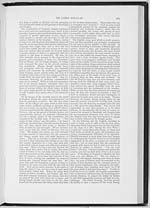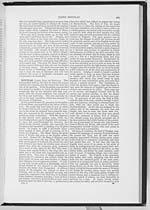464
discovered a place of still greater strength about
two miles distant, had secretly withdrawn thither in
the night. They were soon followed by the English,
who took post on an opposite hill, the river Wear
still interposing itself between the two armies.
The army of Edward, baffled as they had been by
the wariness and dexterity of their enemy, would
seem, in their new position, to have relaxed some-
what in their accustomed vigilance; a circumstance
that suggested to the enterprising spirit of Douglas
the possibility of executing a truly hazardous en-
terprise. Taking with him a body of 200 chosen
horsemen, he at midnight forded the river at a con-
siderable distance from both armies, and by an un-
frequented path gained the rear of the English
camp undiscovered. On approaching the outposts
Douglas artfully assumed the manner of an English
officer going his rounds, calling out as he advanced,
"Ha! St. George, you keep no ward here," and
by this stratagem penetrated, without suspicion, to
the very centre of the encampment, where the king
lay. When they had got thus far the party, no
longer concealing who they were, shouted aloud,
"A Douglas! a Douglas! English thieves, you shall
all die!" and furiously attacking the unarmed and
panic-struck host, overthrew all who came in their
way. Douglas, forcing an entrance to the royal
pavilion, would have carried off the young king but
for the brave and devoted stand made by his domes-
tics, by which he was enabled to escape. Many of
the household, and among others the king's own
chaplain, zealously sacrificed their lives to their
loyalty on this occasion. Disappointed of his prize,
Sir James now sounded a retreat, and charging with
his men directly through the camp of the English,
safely regained his own; having sustained the loss of
only a very few of his followers, while that of the
enemy is said to have exceeded 300 men.
On the day following this night attack, a prisoner
having been brought into the English camp, and
strictly interrogated, acknowledged that general
orders had been issued to the Scots to hold them-
selves in readiness to march that evening, under the
banner of Douglas. Interpreting this information
by the fears which their recent surprisal had inspired,
the English concluded that the enemy had formed
the plan of a second attack; and in this persuasion
drew up their whole army in order of battle, and
so continued all night resting upon their arms. Early
in the morning two Scottish trumpeters having been
seized by the patrols, reported that the Scottish
army had decamped before midnight, and were
already advanced many miles on their march home-
ward. The English could not, for some time, give
credit to this strange and unwelcome intelligence;
but, suspecting some stratagem, continued in order
of battle, till by their scouts they were fully certified
of its truth. The Scottish leaders, finding that their
provisions were nearly exhausted, had prudently re-
solved upon a retreat; and in the evening, having
lighted numerous fires, as was usual, drew off from
their encampment shortly after nightfall. To effect
their purpose the army had to pass over a morass,
which lay in their rear, of nearly two miles in ex-
tent, till then supposed impracticable by cavalry.
This passage the Scots accomplished by means of a
number of hurdles, made of wands or boughs of trees
wattled together, employing these as bridges over
the water-runs and softer places of the bog; and so
deliberately had their measures been executed that,
when the whole body had passed, these were care-
fully removed, that they might afford no assistance
to the enemy should they pursue them by the same
track. Edward is said to have wept bitterly when
informed of the escape of the Scottish army; and
his generals, well aware how unavailing any pursuit
after them must prove, next day broke up the en-
campment, and retired towards Durham.
This was the last signal service which Douglas
rendered to his country; and an honourable peace
having been soon afterwards concluded between the
two kingdoms, seemed at last to promise a quiet and
pacific termination to a life which had hitherto known
no art but that of war, and no enjoyment but that of
victory. However, a different, and to him possibly
a more enviable, fate awaited the heroic Douglas.
Bruce dying not long after he had witnessed the
freedom of his country established, made it his last
request that Sir James, as his oldest and most
esteemed companion-in-arms, should carry his heart
to the Holy Land, and deposit it in the holy sepul-
chre at Jerusalem, to the end that his soul might be
unburdened of the weight of a vow which he felt
himself unable to fulfil.
Douglas, attended by a numerous and splendid
retinue of knights and esquires, set sail from Scot-
land, in execution of this last charge of his deceased
master. He first touched in his voyage at Sluys in
Flanders, where, having learned that Alphonso,
King of Castile and Leon, was then at waged war
with Osmyn, the Moorish King of Granada, he
seems to have been tempted, by the desire of fight-
ing against the infidels, to direct his course into
Spain, with intention from thence to combat the
Saracens in his progress to Jerusalem. Having
landed in King Alphonso's country, that sovereign
received him with great distinction; and not the less
that he expected shortly to engage in battle with his
Moorish enemies. Barbour relates, that while at
this court a knight of great renown, whose face was
all over disfigured by the scars of wounds which he
had received in battle, expressed his surprise that a
knight of so great fame as Douglas should have re-
ceived no similar marks in his many combats. " I
thank Heaven," answered Sir James mildly, "that
I had always hands to protect my face." And
those who were by, adds the author, praised the
answer much, for there was much understanding in it.
Douglas and his brave company, having joined
themselves to Alphonso's army, came in view of the
Saracens near to Tebas, a castle on the frontiers of
Andalusia, towards the kingdom of Granada. Os-
myn, the Moorish king, had ordered a body of 3000
cavalry to make a feigned attack on the Spaniards,
while, with the great body of his army, he designed,
by a circuitous route, unexpectedly to fall upon the
rear of King Alphonso's camp. That king, how-
ever, kept the main force of his army in the rear,
while he opposed a sufficient body of troops to resist
the attack which should be made in front. From
this fortunate disposition the Christian king gained
the day over his infidel adversaries. Osmyn was
discomfited with much slaughter, and Alphonso,
improving his advantage, gained full possession of
the enemy's camp. While the battle was thus
brought to a successful issue in one quarter, Douglas
and his brave companions, who fought in the van,
proved themselves no less fortunate. The Moors,
not long able to withstand their furious encounter,
betook themselves to flight. Douglas, unacquainted
with the mode of warfare pursued among that people,
followed hard, until, finding himself almost deserted
by his followers, he turned his horse, with the inten-
tion of rejoining the main body. Just then, how-
ever, observing a knight of his own company to be
surrounded by a body of Moors who had suddenly
rallied, "Alas!" said he, "yonder worthy knight
shall perish but for present help;" and with the few

![]() Universal Viewer |
Universal Viewer | ![]() Mirador |
Large image | Transcription
Mirador |
Large image | Transcription
![]()

